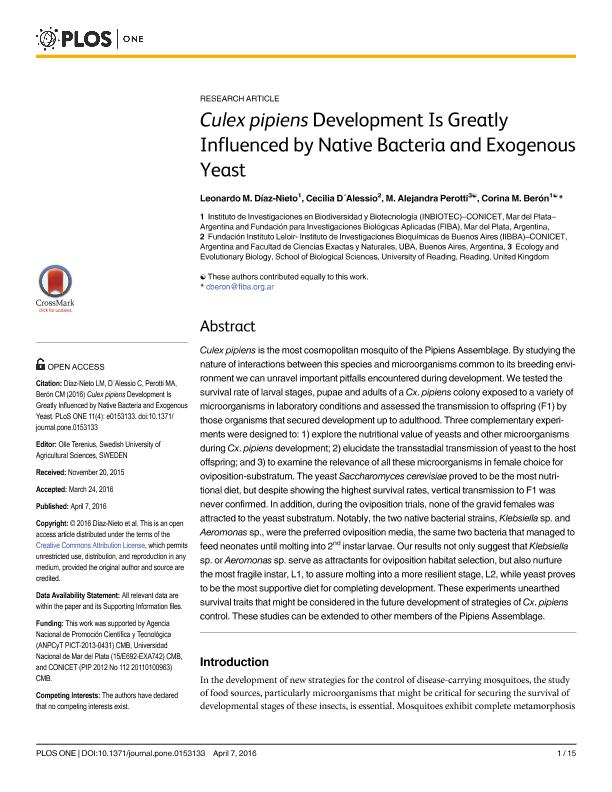Artículo
Culex pipiens development is greatly influenced by native bacteria and exogenous yeast
Fecha de publicación:
04/2016
Editorial:
Public Library of Science
Revista:
Plos One
ISSN:
1932-6203
Idioma:
Inglés
Tipo de recurso:
Artículo publicado
Clasificación temática:
Resumen
Culex pipiens is the most cosmopolitan mosquito of the Pipiens Assemblage. By studying the nature of interactions between this species and microorganisms common to its breeding environment we can unravel important pitfalls encountered during development. We tested the survival rate of larval stages, pupae and adults of a Cx. pipiens colony exposed to a variety of microorganisms in laboratory conditions and assessed the transmission to offspring (F1) by those organisms that secured development up to adulthood. Three complementary experiments were designed to: 1) explore the nutritional value of yeasts and other microorganisms during Cx. pipiens development; 2) elucidate the transstadial transmission of yeast to the host offspring; and 3) to examine the relevance of all these microorganisms in female choice for oviposition- substratum. The yeast Saccharomyces cerevisiae proved to be the most nutritional diet, but despite showing the highest survival rates, vertical transmission to F1 was never confirmed. In addition, during the oviposition trials, none of the gravid females was attracted to the yeast substratum. Notably, the two native bacterial strains, Klebsiella sp. and Aeromonas sp., were the preferred oviposition media, the same two bacteria that managed to feed neonates until molting into 2nd instar larvae. Our results not only suggest that Klebsiella sp. or Aeromonas sp. serve as attractants for oviposition habitat selection, but also nurture the most fragile instar, L1, to assure molting into a more resilient stage, L2, while yeast proves to be the most supportive diet for completing development. These experiments unearthed survival traits that might be considered in the future development of strategies of Cx. pipiens control. These studies can be extended to other members of the Pipiens Assemblage.
Palabras clave:
Culex Pipiens
,
Native Bacteria
,
Exogenous Yeast
,
Development
Archivos asociados
Licencia
Identificadores
Colecciones
Articulos(IIBBA)
Articulos de INST.DE INVEST.BIOQUIMICAS DE BS.AS(I)
Articulos de INST.DE INVEST.BIOQUIMICAS DE BS.AS(I)
Articulos(INBIOTEC)
Articulos de INSTITUTO DE INV. EN BIODIVERSIDAD Y BIOTECNOLOGIA
Articulos de INSTITUTO DE INV. EN BIODIVERSIDAD Y BIOTECNOLOGIA
Citación
Díaz Nieto, Leonardo Martín; D'alessio, Cecilia; Perotti, Maria Alejandra; Berón, Corina Marta; Culex pipiens development is greatly influenced by native bacteria and exogenous yeast; Public Library of Science; Plos One; 11; 4; 4-2016; 1-15; e0153133
Compartir
Altmétricas




